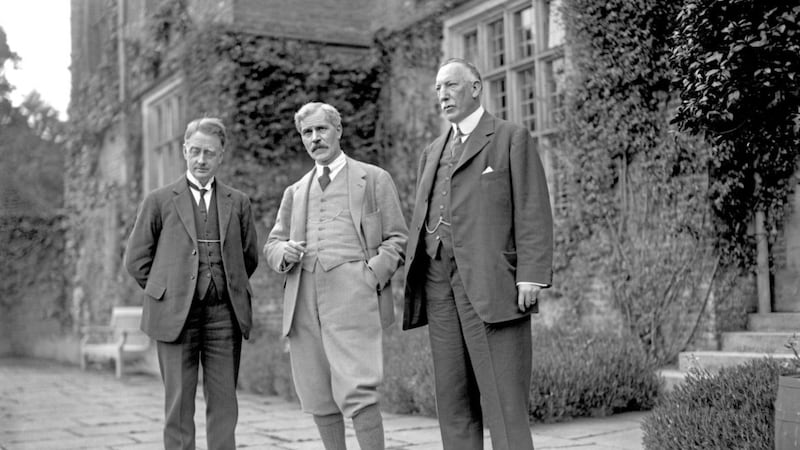Northern Ireland’s leading business groups have written to the secretary of state demanding that civil servants be given legal powers to take important decisions in the absence of devolution or direct rule.
The focus of this benign bureaucratic dictatorship, according to the 12 organisations signing the letter, should be infrastructure planning and projects - in other words, the private sector’s juiciest source of taxpayer revenue.
Meanwhile, information on private donations to political parties in Northern Ireland has finally been published, revealing (a few loopholes notwithstanding) that such donations are virtually non-existent. Almost all party income comes from the taxpayer.
Perhaps these matters are connected. If Northern Ireland’s business community supported politics with its pocket-book, as is normal across the rest of the word, it would have real power to improve politics - certainly more than from moaning to the secretary of state.
What is wrong with buying influence now the system is transparent?
If companies fear donating to one side or the other would alienate customers in a divided society, they should simply follow the American practice of donating to both.
**
Since the Republic’s abortion referendum an idea has taken hold that ‘human rights are not devolved’ - an expression heard from Westminster to Fermanagh as people wonder how to bypass Stormont, whether or not it is restored.
Yet this idea is nonsense. Although the Human Rights Act is UK-wide legislation and Stormont cannot pass laws or enact policies that conflict with it, that is quite different to rights not being devolved.
Westminster is not supposed to legislate or enact policies against the act either, short of repealing it.
Almost everything Stormont does requires a human rights assessment and corresponding action, as a specific legal duty on how devolution works.
If it was really the case that rights were not devolved, how would Stormont pass the abortion law activists are seeking through Human Rights Act arguments in the courts?
**
The PSNI has again taken an extremely strong line against the symbolic delivery of abortion pills, threatening protesters outside Laganside Courts with arrest and prosecution.
There has always been something odd about the priority shown to this offence - political and even religious concerns could be suspected. It is particularly strange for police to fret about abortion pills in Belfast city centre, where officialdom is in denial about the highly visible heroin problem. However, this does at least suggest a solution. Women should buy their abortion pills from the UDA. Then there will not be another word said about it.
**
An EU proposal to continue peace funding after Brexit is welcome but hardly surprising. Peace funding applies to the Republic as well as Northern Ireland and EU programmes of this nature often involve spending a portion in the border regions of neighbouring non-EU states. The whole of Northern Ireland has been defined as a border region for peace funding purposes. A more interesting question is whether this sets a precedent for other Brexit issues. Trade and customs problems would be significantly simplified if the whole of Northern Ireland was considered a border region.
**
The hyponatraemia inquiry into the deaths of five children at Northern Ireland hospitals ran for 14 years - a UK record. The duration and complexity of inquiries counts against them in maintaining the press and public interest required to generate political pressure and enact a report’s findings. In fact, this is something the political system is often accused of counting on.
So it is useful for Prof Gabriel Scally, adviser to the inquiry chair, to have summed up everything in a sentence.
“This is a remarkable account of lies, deceit and cover-up, of negligence and of secrecy and deliberate obstruction,” he told the BBC.
It is also useful to note that after months of evasion by health managers and professional bodies within Northern Ireland, all claiming the inquiry’s recommendations are sadly unworkable, the UK bodies representing the five medical fields involved have jointly declared the exact opposite.
**
Indirect rule, example 492: an occasional item featuring decisions by civil servants who cannot make decisions. Forty extra places have been provided at Bangor Academy after an outcry over schoolchildren having to travel as far away as Portaferry. The Department of Education said it acted “in light of the scale of over-subscription this year in the area” - but there is always some reason why a shortage of places is a special local case and this is normally considered among the most contentious of ministerial decisions. Frankly, what makes this case look different is that it is in North Down, where all the civil servants live.
**
We have reached that time of year when teachers on maternity or long-term sick leave must drag themselves back into the classroom to secure their salaries over the summer, causing disruption and even distress to pupils.
Teachers should not be blamed for this - why should they lose two months’ pay? The fault lies with the inflexible contracts and administrators that make such behaviour necessary. However, it does not help that trade unions cannot even bring themselves to admit ‘June recovery syndrome’ exists.
newton@irishnews.com








